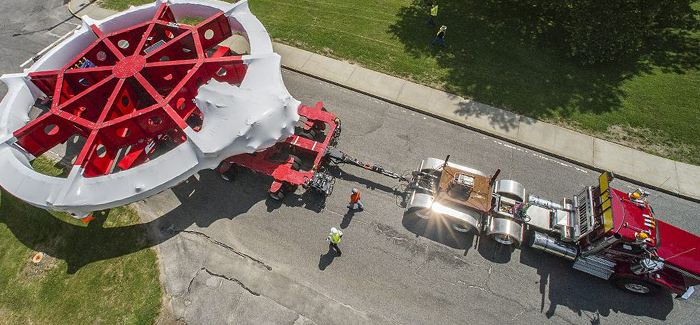After a five-week, 3,200-mile waterway journey, a 50-foot electromagnet arrived at Fermilab on July 26. The magnet is the centerpiece of Fermilab’s new Muon g-2 experiment, which will study the properties of subatomic particles called muons. Previously located at Brookhaven National Laboratory in New York, the magnet was relocated to Fermilab at a fraction of the cost of building a new one. But the process was arduous for the 17-ton ring, which could not be taken apart. Made up of three aluminum rings with superconducting coils inside, it traveled by barge down the Atlantic coast, around Florida into the Gulf of Mexico, and up a series of rivers to its new Illinois location.
Raghuram Rajan, a professor of finance at Chicago Booth, has been appointed governor of the Reserve Bank of India. An economic adviser to Indian prime minister Manmohan Singh since 2008, Rajan has served for the past year as the government’s chief economic adviser, a position analogous to his Chicago Booth colleague Austan Goolsbee’s role in the first Obama administration. Rajan, best known for warning of risks in the financial system years before the 2008 economic crisis, will be on leave from the University during his tenure as governor.
Bryan Samuels, AM’93, has been named executive director of the Chapin Hall Center for Children. As commissioner of the US Department of Health and Human Services’ Administration on Children, Youth, and Families since 2010, Samuels was the highest-ranking federal child welfare policy maker. He emphasized data-driven approaches to improving the social and emotional well-being of vulnerable children, overseeing programs addressing child abuse and neglect, runaway and homeless youth, domestic violence, and teen pregnancy.
The University of Chicago Booth School of Business will relocate its Asia executive MBA program from Singapore to Hong Kong. In 2014 Chicago Booth faculty will begin teaching at the new location, while maintaining activities in Singapore. The expansion into Hong Kong is aimed at deepening Chicago Booth’s engagement in Asia. Sunil Kumar, dean of the business school, noted that proximity to China, the world’s second-largest economy, made the move especially appealing.
For the second year in a row, 100 percent of University of Chicago Charter School graduates were accepted into college. Chicago mayor Rahm Emanuel, the convocation ceremony’s keynote speaker, praised the students, their parents, and their teachers and urged the students to return to Chicago after college to be a part of the city’s future. “I have high expectations for you. … When you’re done with college, I want you to call Chicago home, because if you call Chicago home, we have a great future in the city—as great as you are.”
Steven Sibener will lead the Institute of Molecular Engineering water research initiative, a collaboration with Ben-Gurion University of the Negev and Argonne National Laboratory. Sibener, the Carl William Eisendrath distinguished service professor in chemistry and the James Franck Institute, will serve a two-year term as director, leading the application of nanotechnology discoveries to make clean drinking water cheaper and more plentiful.
Bernard Harcourt, the Julius Kreeger professor of law and political science, has been elected to a chair at the École des Hautes Études en Sciences Sociales in Paris, the leading European social science institute, whose scholars have included Claude Levi-Strauss, Roland Barthes, and Jacques Derrida. Harcourt, who will hold the chair in political theory and juridical practices, will visit the institute annually as a permanent visitor.
Ngô Bao Châu and Dam Thanh Son are among 13 mathematicians, theoretical physicists, and theoretical computer scientists named 2013 Simons Investigators. Ngo, the Francis and Rose Yuen distinguished service professor in mathematics, won the 2010 Fields Medal for his proof of Langland’s fundamental lemma. Son, University Professor of physics, has published in a variety of subfields, including quantum chromodynamics, theoretical nuclear physics, condensed matter physics, and atomic physics. They will each receive $500,000 over the next five years, allowing them to engage in long-term study of questions fundamental to their fields.
Applied education researcher Elaine Allensworth has been named the Lewis-Sebring director of the Consortium on Chicago School Research. Allensworth, who joined the consortium in 1998, worked most recently as its interim director. She researches factors predicting whether students will drop out of high school. She also contributed to the consortium’s study of the relationship between school organizational structures and community conditions in determining academic success, which led to the book
Organizing Schools for Improvement (University of Chicago Press, 2010), called the “most important research on urban schools in the past decade.”
In acknowledgment of his pioneering work in environmental finance and carbon trading, and his contribution to French-American relations, the French government has inducted Richard Sandor into the French National Order of the Legion of Honor. A Law School lecturer, Sandor is the chair and CEO of Environmental Financial Products LLC. He and his wife, Ellen, are the principal donors to a $10 million endowment in law and economics in honor of his mentor, Nobel laureate Ronald Coase, the Clifton R. Musser professor emeritus of economics at the Law School. The Coase-Sandor Institute for Law and Economics was named in recognition of their contributions.

